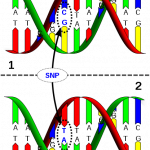The Future of Medicine
 Emerging DNA technologies continue to offer us many new insights into our genome, and its implications on human disease. One area that is currently under much scrutiny is how different patients are responding differently to certain drug treatments. Researchers are now finding that some people have a genetic predisposition to how they will react to a drug. If there is some way that we could detect this in the doctor’s office as they are writing the prescription, it would help save time and lives as we try to combat these diseases.
Emerging DNA technologies continue to offer us many new insights into our genome, and its implications on human disease. One area that is currently under much scrutiny is how different patients are responding differently to certain drug treatments. Researchers are now finding that some people have a genetic predisposition to how they will react to a drug. If there is some way that we could detect this in the doctor’s office as they are writing the prescription, it would help save time and lives as we try to combat these diseases.
The Imperial College London and its affiliate-company DNA Electronics have developed a portable device that will allow doctors to detect for certain areas of the DNA that make us respond differently to drugs. The technology is based upon the fact that our genome is filled with areas that contain single nucleotide polymorphisms (SNPs). These are areas of our genome where there are single bases that differ among members of the human population. Responses to medication can be predicted by the location of particular SNPs.
The hand-held device, which is called the SNP Dr., will be able to immediately detect the DNA sequences of the patient, instead of sending the sample out to be analyzed (which takes time and money). Now the doctor will be able to detect whether or not the patient will have an adverse response to a particular drug, and make better decisions about treatment options.
| Print article | This entry was posted by Jennifer Galasso on October 13, 2009 at 12:47 pm, and is filed under DNA Interactive. Follow any responses to this post through RSS 2.0. You can skip to the end and leave a response. Pinging is currently not allowed. |









